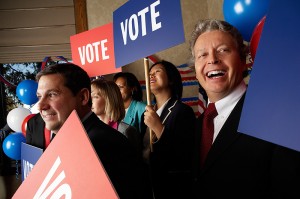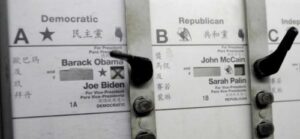Becky Kospanova
 On November 6, 2012, American people will vote to determine who is going to be the President and the Vice-President of the USA for the next four years. The main choice is between present Democratic President Barak Obama and his Vice-President Joe Biden and Republican Mitt Romney, former governor of Massachusetts, and his Vice-President nominee Paul Ryan. However, there are two other candidates who have achieved ballot access sufficient enough to win the election by the majority of the Electoral College: the Libertarian nominee and former New Mexico Governor Gary Johnson and the Green Party nominee Jill Stein. Still, many people do not fully comprehend what Electoral College is and how it influences the outcome of Presidential elections.
On November 6, 2012, American people will vote to determine who is going to be the President and the Vice-President of the USA for the next four years. The main choice is between present Democratic President Barak Obama and his Vice-President Joe Biden and Republican Mitt Romney, former governor of Massachusetts, and his Vice-President nominee Paul Ryan. However, there are two other candidates who have achieved ballot access sufficient enough to win the election by the majority of the Electoral College: the Libertarian nominee and former New Mexico Governor Gary Johnson and the Green Party nominee Jill Stein. Still, many people do not fully comprehend what Electoral College is and how it influences the outcome of Presidential elections.
The Electoral College was established by the Second Article of the U.S. Constitution and was amended in 1804 by the 12th Amendment. Basically, the Founding Fathers had a choice between a system where general population would cast its vote and choose the President based on a majority of votes received by a candidate; or a system of Electoral College in which the President is chosen based on the number of electors’ votes received. The Electoral College system assigns a number of elector votes to each state depending on the number of state’s representatives in the House of Representatives and the Senate. As such, each state has a number of electors equal to the number of its representatives in the U.S. House of Representatives plus an additional vote for its two U.S. Senators. Thus, if general population of some particular state votes for a specific candidate, then based on the majority of votes received, that candidate gets all the pledged electors’ votes from that state. At the moment, there are 538 electors who will determine the future President of the USA. The candidate needs to get 270 elector votes to be elected as a President of the USA. If none of the candidates gets the required number of 270 then, according to the 12th Amendment, the House of Representatives chooses the President based on the number of votes received from the states (each state gets one vote). It had happened only two times in American history when Thomas Jefferson (1801) and John Adams (1825) were elected by the House of Representatives.
 There are many critics of the Electoral College system. Many people argue that the true voice of American people gets lost during the Presidential elections and the outdated Electoral College system does no longer reflect the real choice of general population. This critique is not without some basis. Everybody remembers the Presidential elections of 2000 when Al Gore lost the election race to George W. Bush despite gaining the majority of popular votes but losing the Electoral College votes. Bush had won 271 electoral votes while only getting 50,456,002 popular votes and Gore had won 50,999,897 popular votes but only 266 electoral votes. However, it was mostly an exception rather then the rule. So far, the same situation has happened only two more times in history when Republican candidate Rutherford B. Hayes won the elections against Democrat Samuel Tilden in 1876; and Republican Benjamin Harrison won the elections against Democrat Grover Cleveland in 1888 on the basis of electoral votes.
There are many critics of the Electoral College system. Many people argue that the true voice of American people gets lost during the Presidential elections and the outdated Electoral College system does no longer reflect the real choice of general population. This critique is not without some basis. Everybody remembers the Presidential elections of 2000 when Al Gore lost the election race to George W. Bush despite gaining the majority of popular votes but losing the Electoral College votes. Bush had won 271 electoral votes while only getting 50,456,002 popular votes and Gore had won 50,999,897 popular votes but only 266 electoral votes. However, it was mostly an exception rather then the rule. So far, the same situation has happened only two more times in history when Republican candidate Rutherford B. Hayes won the elections against Democrat Samuel Tilden in 1876; and Republican Benjamin Harrison won the elections against Democrat Grover Cleveland in 1888 on the basis of electoral votes.
Nevertheless, no matter what one’s personal stand on the subject of Electoral College system is, the main thing is to just vote and make sure that your voice has been heard. After all, the future of the country greatly depends on the person who will lead the American nation for the next four years.

